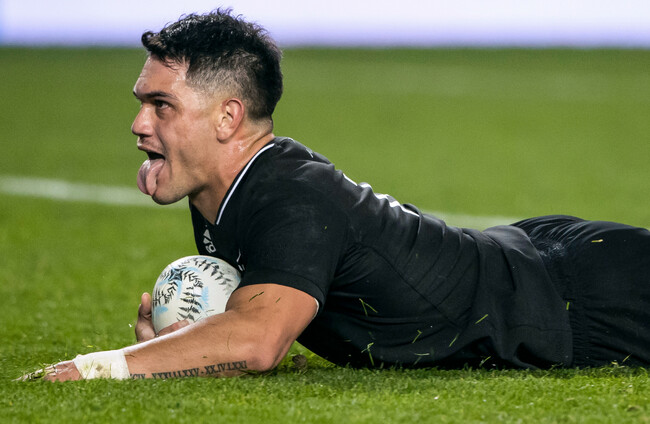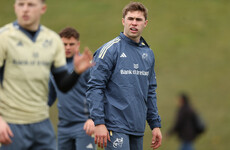NEW ZEALAND 42
IRELAND 19
IT TOOK 15 months to build the dream and then 16 minutes to shatter it.
After losing just one of their last 13 games, beating England twice and New Zealand along the way, there really was a sense of hope this Irish team had the ability to make history and beat the All Blacks on their patch.
That feeling had not changed after the opening quarter but by half-time, everything had changed.
Having started positively, getting the opening try of the game and putting passages of superb rugby together, Ireland fell into panic mode in the second quarter of this game and blew whatever chance they had of winning it.
It really was an extraordinary meltdown. Five-nil up after 22 minutes, they were 28-5 down after 38. They didn’t just lose the lead in this period but also their captain – Johnny Sexton going off hurt just after the half-hour mark – his injury arriving midway through the move that changed the game.
The score was 7-5 New Zealand at this stage. Up to this point, Ireland had played all the rugby, Peter O’Mahony excelling, Jamison Gibson-Park having a fine opening quarter prior to a disastrous second one.
The clock was ticking towards 30 minutes when everything changed, the ball in the New Zealand 22, Ireland going through the phases, but doing so without much structure or confidence, Hugo Keenan scrambling to catch one pass, Sexton getting a bang and losing his feet just seconds earlier, Gibson-Park trying to keep the play flowing even though he was temporarily without a half-back partner.
What they needed was composure, what they got was panic, Garry Ringrose attempting a simple-enough pass to James Lowe on the left wing. Lowe, however, slipped; Sevu Reece, the All Blacks’ right winger, did not, intercepting the ball to run from his 22 all the way under the sticks.
And with that 7-5 had turned into 14-5; Sexton had gone off; and the void was felt right across the team. There and then they just needed to slow things down, keep their heads and get through to half-time in one piece.
Instead Gibson-Park made a terrible decision off Ireland’s next attack. Referee Karl Dickson had awarded Ireland a penalty just inside the All Blacks half, gifting sure access to the New Zealand 22.
Rather than allow Joey Carbery – Sexton’s replacement – find touch, Gibson-Park took a quick tap, thinking he had an overlap to his right. Well, he didn’t. The All Blacks turned the ball over and it eventually ended up in the Irish 22.
Still there was a chance for Ireland to do the simple thing after Dan Sheehan found James Ryan at the front of the lineout. Again, they took the wrong option, trying to steal a few extra yards before exiting, suffering another turnover at the breakdown, gifting Beauden Barrett the time and space to kick a clever little grubber in behind the Irish defence. Quinn Tupaea collected it and touched down. Suddenly it was 21-5 and the game was gone, 36 minutes played.
And it’d get worse two minutes later, another try coming from seemingly nowhere, Aaron Smith with the break this time, no Irish defender in sight at the back of the ruck, before Smith’s grubber eventually bounced favourably towards Ardie Savea, who pounced to score. Jordie Barrett nailed his fourth conversion of the afternoon and 23 points separated the sides.
No one, but no one, could have predicted this 20 minutes earlier because at this stage it was Ireland who were doing their stuff, making such a bright opening, just five minutes and fifty three seconds on the clock when Keith Earls got across the tryline to score.
The move that preceded it highlighted everything that is good about Irish rugby; the bravery of Dan Sheehan to throw to the tail of the lineout, the skill and athleticism of O’Mahony to catch it while falling backwards.
Sheehan’s influence in the move hadn’t ended. In fact it was only starting, as he was the Irish player who got across the gainline, gifting Ireland territory in the New Zealand 22.
From there, the phases kept piling up, Gibson-Park making one clever decision after the next, frequently passing to the short side while shaping to go the other way, allowing Josh van der Flier, Sheehan twice, O’Mahony and Tadhg Furlong to make yards.
Eventually, with a penalty advantage coming, they spun the ball wide, Sexton going out the back, Ringrose freeing Earls, the veteran using clever footwork to get across. 5-0, Ireland.
Believe it or not they could have been further ahead, O’Mahony stealing balls on the floor and in the air, even sending in a grubber kick which would have ended in a score had Smith not scrambled across to force the ball into touch.
Then there was the kick from Sexton that led to Ringrose gathering ahead of Jordie Barrett with Gibson-Park running a supporting line. It appeared as if the pass had been timed perfectly – but only as far as Beauden Barrett was concerned. He intercepted it, New Zealand escaped.
Then things started to go wrong. An attacking scrum in the All Blacks 22 saw Andrew Porter penalised and it wasn’t long afterwards when Jordie Barrett got his first try of the game, when he picked a clever line, arriving at pace and getting across to score on 22 minutes.
Still, you never imagined then what would happen next, those three tries for New Zealand in the 30th, 36th and 38th minutes, scores which took the game completely out of Ireland’s hands.
After try No4 the whistle blew for half-time but really ref Dickson would have been as well signalling for full-time because this match was over.
Yes, there was a try for Ringrose, created by Lowe’s soft hands and awareness; but there were also two converted tries for the All Blacks, Savea with one, when he skinned Ringrose on the outside and then Earls on the inside; debutant Pita Gus Sowakula with another, when he burst across the line off the base of a scrum.
There was misfortune for Ireland when the TMO disallowed two Irish tries in quick succession, Joey Carbery’s attempt ruled out for a double carry; Josh van der Flier’s follow-up effort for a knock-on. The Carbery ruling was harsh. Not that it would have made a difference.
Late on, replacements Conor Murray and Bundee Aki did make a small difference, the pair combining to allow Aki score Ireland’s third try which reduced the gap to 23 points. A hammering. There is no other way of describing it.
New Zealand scorers
Tries: Jordie Barrett, Reece, Tupaea, Savea 2, Sowakula
Conversions: J Barrett (6/6)
Ireland scorers
Tries: Earls, Ringrose, Aki
Conversions: Sexton (0/1), Carbery (2/2)
New Zealand
Jordie Barrett; Sevu Reece, Rieko Ioane (rep: Braydon Ennor ’68), Quinn Tupaea (rep: Richie Mo’unga ’60), Leicester Fainga’anuku; Beauden Barrett, Aaron Smith (rep: Finlay Christie ‘62); George Bower (rep: Karl Tu’inukuafe ‘55), Codie Taylor (rep: Samisoni Taukei’aho ‘55), Ofa Tuungafasi (rep: Angus Ta’avao ‘55); Brodie Retallick (rep: Pita Gus Sowakula ’64), Samuel Whitelock; Scott Barrett, Sam Cane (rep: Dalton Papalii ’68), Ardie Savea
Ireland
Hugo Keenan; Keith Earls (rep: Bundee Aki ’56), Garry Ringrose, Robbie Henshaw, James Lowe; Johnny Sexton (rep: Joey Carbery ‘32), Jamison Gibson-Park (rep: Conor Murray ‘72); Andrew Porter, Dan Sheehan (rep: Dave Heffernan ‘63-67), Tadhg Furlong (rep: Tom O’Toole ‘67); James Ryan, Tadhg Beirne (rep: Kieran Treadwell ’65); Peter O’Mahony, Josh van der Flier, Caelan Doris (rep: Jack Conan ’57)
Replacements not used: Cian Healy
Attendance: 48,195
Referee: Karl Dickson (RFU)
Get instant updates on your province on The42 app. With Laya Healthcare, official health and wellbeing partner to Leinster, Munster and Connacht Rugby.












A machine, what is himself, Messi and zlatan eating?
@Paully Kells: Zlatan isn’t even close, stop.
@Seosamh: He’s 39 though in fairness